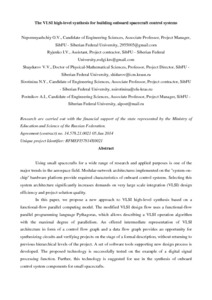The VLSI High-Level Synthesis for Building Onboard Spacecraft Control Systems
Скачать файл:
Автор:
Nepomnyashchiy, O. V.
Ryjenko, I. V.
Shaydurov, V. V.
Sirotinina, N. Y.
Postnikov, A. I.
Коллективный автор:
Институт космических и информационных технологий
Кафедра вычислительной техники
Дата:
2017Журнал:
Proceedingsf the Scientific-Practical Conference "Research and Development - 2016"Библиографическое описание:
Nepomnyashchiy, O. V. The VLSI High-Level Synthesis for Building Onboard Spacecraft Control Systems [Текст] / O. V. Nepomnyashchiy, I. V. Ryjenko, V. V. Shaydurov, N. Y. Sirotinina, A. I. Postnikov // Proceedingsf the Scientific-Practical Conference "Research and Development - 2016". — 2017.Аннотация:
Using small spacecrafts for a wide range of research and applied purposes is one of the major trends in the aerospace field. Modular-network architectures implemented on the “system-on-chip” hardware platform provide required characteristics of onboard control systems. Selecting this system architecture significantly increases demands on very large-scale integration (VLSI) design efficiency and project solution quality. In this paper, we propose a new approach to VLSI high-level synthesis based on a functional-flow parallel computing model. The modified VLSI design flow uses a functional-flow parallel programming language Pythagoras, which allows describing a VLSI operation algorithm with the maximal degree of parallelism. An offered intermediate representation of VLSI architecture in the form of a control-flow graph and a data-flow graph provides an opportunity for synthesizing circuits and verifying projects on the stage of a formal description, without returning to previous hierarchical levels of the project. A set of software tools supporting new design process is developed. The proposed technology is successfully tested on the example of a digital signal processing function. Further, this technology is suggested for use in the synthesis of onboard control system components for small spacecrafts.

